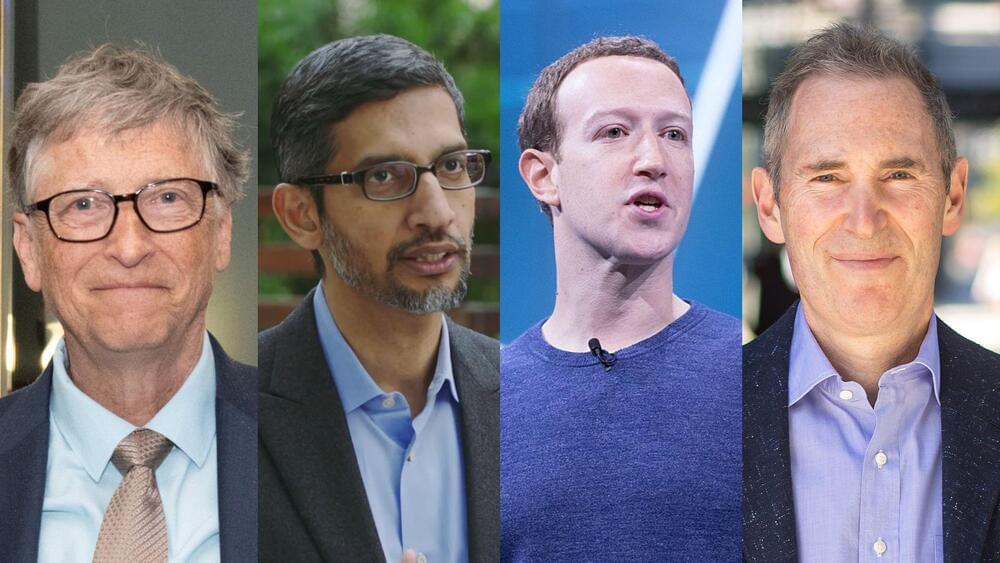IBM chief executive Arvind Krishna said the company expects to pause hiring for roles it thinks could be replaced with artificial intelligence in the coming years.




The quarterly reports by these tech behemoths show their efforts to increase AI productivity in the face of growing economic worries.
The US tech giants like Alphabet, Microsoft, Amazon, and Meta are increasing their large language model (LLM) investments as a show of their dedication to utilizing the power of artificial intelligence (AI) while cutting costs and jobs.
Since the launch of OpenAI’s ChatGPT chatbot in late 2022, these businesses have put their artificial intelligence AI models on steroids to compete in the market, CNBC reported on Friday.
The IT behemoths Alphabet, Microsoft, Amazon, and Meta are increasing their large language model (LLM) investments as a show of their dedication to utilizing the power of artificial intelligence (AI) while cutting costs and jobs.

As highlighted in a recent article, the release of ChatGPT in its various guises, along with numerous other generative AI-based technologies, has heralded a flurry of articles, studies, and headlines lauding the often catastrophic impact such technologies will have on jobs and society more broadly.
It’s the kind of simplistic and often doom-laden narrative that so often thrives on social media. As Greg Berman and Aubrey Fox remind us in their recent book Gradual, however, change seldom happens rapidly and almost never happens in such a linear fashion.
The study surveyed executives from 200 large companies and found that while most recognized the importance of new technologies, many were unrealistic about their ability to transform their businesses. The survey revealed that companies that took a more measured and realistic approach to technology adoption tended to be more successful.
Overall, these studies suggest that technological predictions are often overly optimistic and that many new technologies fail to meet their initial expectations.
So while many technologies are portrayed as being rapidly adopted, the reality is usually very different. The challenges are perhaps best summed up by Daniel Patrick Moynihan, who famously remarked that when considering change, “we constantly underestimate difficulties, overpromise results, and avoid any evidence of incompatibility and conflict, thus repeatedly creating the conditions of failure out of our desperate need for success.”

In Silicon Valley, some of the brightest minds believe a universal basic income (UBI) that guarantees people unrestricted cash payments will help them to survive and thrive as advanced technologies eliminate more careers as we know them, from white collar and creative jobs — lawyers, journalists, artists, software engineers — to labor roles. The idea has gained enough traction that dozens of guaranteed income programs have been started in U.S. cities since 2020.
Yet even Sam Altman, the CEO of OpenAI and one of the highest-profile proponents of UBI, doesn’t believe that it’s a complete solution. As he said during a sit-down earlier this year, “I think it is a little part of the solution. I think it’s great. I think as [advanced artificial intelligence] participates more and more in the economy, we should distribute wealth and resources much more than we have and that will be important over time. But I don’t think that’s going to solve the problem. I don’t think that’s going to give people meaning, I don’t think it means people are going to entirely stop trying to create and do new things and whatever else. So I would consider it an enabling technology, but not a plan for society.”
The question begged is what a plan for society should then look like, and computer scientist Jaron Lanier, a founder in the field of virtual reality, writes in this week’s New Yorker that “data dignity” could be an even bigger part of the solution.

Now, we live in a time in which AI research and technology is advancing exponentially. In the coming years, AI — and ultimately AGI — has the potential to drive one of the greatest social, economic and scientific transformations in history.
That’s why today Sundar is announcing that DeepMind and the Brain team from Google Research will be joining forces as a single, focused unit called Google DeepMind. Combining our talents and efforts will accelerate our progress towards a world in which AI helps solve the biggest challenges facing humanity, and I’m incredibly excited to be leading this unit and working with all of you to build it. Together, in close collaboration with our fantastic colleagues across the Google Product Areas, we have a real opportunity to deliver AI research and products that dramatically improve the lives of billions of people, transform industries, advance science, and serve diverse communities.
By creating Google DeepMind, I believe we can get to that future faster. Building ever more capable and general AI, safely and responsibly, demands that we solve some of the hardest scientific and engineering challenges of our time. For that, we need to work with greater speed, stronger collaboration and execution, and to simplify the way we make decisions to focus on achieving the biggest impact.
Despite the impressive recent progress in AI capabilities, there are reasons why AI may be incapable of possessing a full “general intelligence”. And although AI will continue to transform the workplace, some important jobs will remain outside the reach of AI. In other words, the Economic Singularity may not happen, and AGI may be impossible.
These are views defended by our guest in this episode, Kenneth Cukier, the Deputy Executive Editor of The Economist newspaper.
For the past decade, Kenn was the host of its weekly tech podcast Babbage. He is co-author of the 2013 book “Big Data”, a New York Times best-seller that has been translated into over 20 languages. He is a regular commentator in the media, and a popular keynote speaker, from TED to the World Economic Forum.

To build a workforce that can meet the expected future demand in the quantum sector, we need to train many more quantum-literate educators and marshal support for them.
In 2018 the US federal government passed the National Quantum Initiative Act, a program designed to accelerate the country’s quantum research and development activities. In the next decade, quantum information science and quantum technologies are expected to have a significant impact on the US economy, as well as on that of other countries. To fulfill that promise, the US will need a “quantum-capable” workforce that is conversant with the core aspects of quantum technologies and is large enough to meet the expected demand. But even now, as quantum-career opportunities are just starting to appear, supply falls behind demand; according to a 2022 report, there is currently only around one qualified candidate for every three quantum job openings [1]. We call for education institutions and funding agencies to invest significantly in workforce development efforts to prevent the worsening of this dearth.
Most of today’s jobs in quantum information science and technology (QIST) require detailed knowledge and skills that students typically gain in graduate-level programs [2]. As the quantum industry matures from having a research and development focus toward having a deployment focus, this requirement will likely relax. The change is expected to increase the proportion of QIST jobs compatible with undergraduate-level training. However, 86% of QIST-focused courses currently take place at PhD-granting research institutions [3]. Very few other undergraduate institutions offer opportunities to learn about the subject. To meet the future need, we believe that aspect needs to change with QIST education being incorporated into the curricula at predominantly undergraduate institutions and community colleges in the US. However, adding QIST classes to the curricula at these institutions will be no easy task.

The pandemic also helped by normalizing remote work.
A new report by Vice.
“That’s the only reason I got my job this year,” one worker referred to only as Ben said of OpenAI’s tool.
Fulltimetraveller/iStock.
Artificial-intelligence tools can enable remote workers to not just more than one job, but to do them with time left to spare. Vice spoke anonymously to various workers holding down two to four full-time jobs with help from these tools and they all were in agreement that it is an ideal way to increase one’s income.